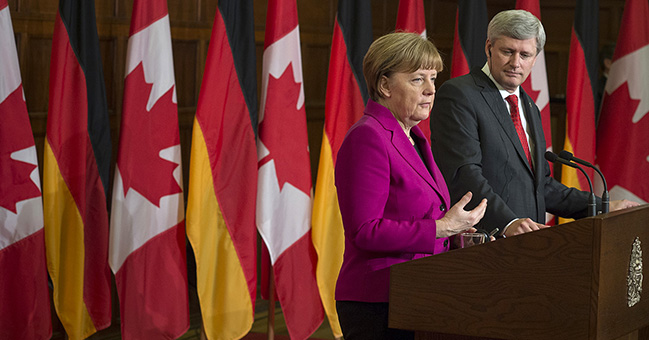Angela Merkel in Canada
CETA trade agreement a good opportunity
Chancellor Angela Merkel believes that the CETA trade agreement between the EU and Canada offers major advantages for Europe, "particularly for Germany as an exporting nation". With Canada’s Prime Minister Stephen Harper she also discussed the G7 summit, the Greek debt crisis and the conflict in Ukraine.
 Hoping for a diplomatic solution - Angela Merkel and Stephen Harper also discussed the Ukraine crisis
Source: Bundesregierung/Bergmann
Hoping for a diplomatic solution - Angela Merkel and Stephen Harper also discussed the Ukraine crisis
Source: Bundesregierung/Bergmann
The trade agreement, the G7 summit, but also a large number of crises – reason enough to keep up the transatlantic partnership with Canada every bit as intensively as with the USA. During her visit to Ottawa, Chancellor Angela Merkel said that she was happy to be back in Canada. After her visit to Washington, she flew on to the Canadian capital.
CETA trade agreement
In view of the current weak growth in Europe the agreement offers an excellent opportunity to "foster growth in trade with Canada", said Angela Merkel. "We are currently in the process of transposing the agreement into law, and there are still a few matters that must be clarified," she continued. Germany will encourage the European Commission to come to a swift conclusion. She sees "huge benefits for us in Europe, particularly for Germany as an exporting nation".
G7 Presidency
Angela Merkel’s visit also served to prepare for the G7 summit to be held in summer. The development of the global economy is a major issue, said the Chancellor.
She discussed "health financing issues" with Stephen Harper. During its G7 Presidency, Canada launched a large number of initiatives and it supports Germany’s activities.
Keeping Greece in the euro zone
With a view to the Greek debt crisis, the Chancellor said, "We are now awaiting concrete proposals regarding the existing programme." The Greek government has only been in office for a few days. Germany’s policy is geared "to keeping Greece in the euro zone", stressed Angela Merkel, "and if I have understood correctly, the majority of the people in Greece too would like to see this".
Angela Merkel pointed to the principle of cooperation within the EU. It builds on two pillars: firstly on solidarity among member states, and secondly on the efforts of the countries following an assistance programme.
Ukraine crisis
The Chancellor and the Canadian Prime Minister agreed that the European peace order and the territorial integrity of Ukraine must be secured. Canada and Germany are consulting and coordinating their actions closely in this regard. The Chancellor said that she is "very grateful that Canada is supporting all attempts and all efforts to find a diplomatic solution".

